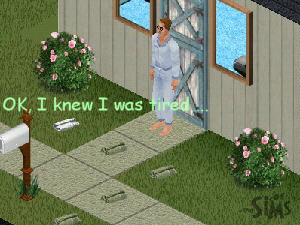Monday 29 October 2001

|
Pic of the day: If you don't read the papers when they are paper, you're not likely to pay for them online. (Screenshot from The Sims.) Paying for contentSorry for another gray entry, but as usual it's about something that interests me. And probably some of you, too. It's the recurring question about paying for content on the Internet. A number of Scandinavian newspapers are constantly considering making their online editions available only for paying readers. Some of them are already trying. Now one Norwegian paper, BA, has made their special tax section pay-only. This is particularly hilarious because the main attraction, the lists of people's taxes, may not even be legal to distribute online, even though they are freely available at the local tax office ... But even so, it represents something new, and other papers are watching like hawks to see what happens. ***Paying for online content is certainly nothing new. It has been said that pornography has been the only profitable Internet business, and a driving force in the growth of the Internet. From what I understand, paying for content has long been the rule there, though I have not tried it myself. As I've mentioned before, porn is not my thing. But it is a prime example of individual direct payment for online content. What I have tried however is subscribing to The Economist. This magazine has a few news articles and editorials available on the Net for free. You can however subscribe to the whole content of the paper edition, as well as five years of archive, at a price that is comfortably lower than subscribing to the paper edition. For those of us who don't have a problem with reading on-screen, this is quite handy. Especially compared to keeping a stack of a few years of The Economist on the kitchen counter, as I used to. But The Economist is a rather specialized magazine of high quality that I used to buy regularly in paper form. This does not mean it would work with general news. These are not something I spend money on normally, as there are so many free sources. For instance, in Norway we have a 24-hour radio channel sending news, presumably paid for with our tax money. (I don't think it is available in all of Norway over radio yet, though I have it in Kristiansand. It is available on the net though.) There are also news on the general channels of radio and TV (not that I have a TV, but I suppose most of you have). And the news sources on the Internet are too many to keep up with. On the other hand, the online newspapers do lose money, and lots of it. If this sounds as puzzling to you as it did to me, it bears mention that their online editions are different from their paper editions. Not just smaller, but different. They have different journalists doing different work to produce different content. Originally, the idea was that advertising would pay for it. But this did not come to pass. The mad rush to throw money into anything online came to a stop. Advertising space has become cheaper and cheaper until it is now almost worthless. ***A few words on online advertising here. I have written in the past that I like online advertising. I want to confirm this. I do not use ad-stripping software, except that I often turn off JavaScript when I don't need it. And bear in mind that I live in Norway and spend much of my time on international web sites, where the ads are even less interesting to me. (I'm not likely to get a US credit card or buy a home there anytime soon.) But I think I should give them any chance they can get. They do, after all, pay my content. I pay the connection. Here in Europe, it is still common to pay per minute for Internet access. This means that ads don't just clutter the screen and slow down loading, they actually cost me money. I still think it is worth it, compared to the hassle of micropayment. Back to the online newspapers. What is my suggestion? You know I would not complain just to make the world a worse place. I have ideas, though I cannot swear they are good ideas. What I think is that newspapers who already have a paper edition, should drop their online news desk and simply use articles from the paper edition. Or the other way around, if you will. Simplify the news page; just use headlines as links. If they don't work as links, why do you think they will be good headlines? Headlines should be short and essential. Use them to link to the article. Minimize fancy formatting. Spend only a few seconds on each article, to upload it if it seems appropriate for the web edition. If you're getting the right news, people will read it. It sure beats losing millions. And it probably beats going pay and seeing the readership drop to only include your favorite aunts. Speaking of which, no, I have no intention of ever going pay here in the Chaos Node! ^.^ |
Drizzle day. |
Yesterday <-- This month --> Tomorrow?
One year ago
Two years ago